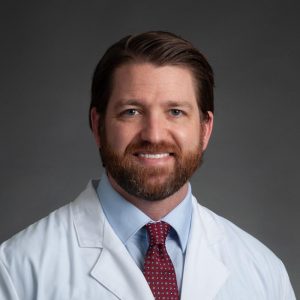You ate a heavy dinner an hour or so ago, and now you’re experiencing a discomfort that seems to be rising up your chest. Is it heartburn or is it GERD? And is there really a difference between the two?
The answer to the second question is yes. While GERD, acid reflux and heartburn are often mentioned interchangeably, they aren’t really the same.
How you’re treated—and whether you require treatment at all—depends on which you are experiencing.

Garrison Smith, MD, FACS, general surgeon with West Tennessee Medical Group Jackson Surgical Associates, has some insight to share about both heartburn and GERD. Keep reading to learn about the two conditions, as well as how they’re treated.
What Is Heartburn?
Well, the first thing to note is that heartburn isn’t actually your heart burning. In fact, it’s unrelated to the heart.
The second important thing to note? Heartburn isn’t actually a condition—it’s a symptom.
Most of us will experience heartburn at one time or another. It’s a really common symptom of many different medical conditions affecting the GI system, including GERD. More than 60 million Americans experience heartburn at least once each month.
If you’ve ever had heartburn, you are familiar with how it feels. It’s a burning discomfort in the chest that occurs due to acid in the esophagus.
In most cases, mild, infrequent heartburn can be treated with over-the-counter medications such as antacids. You can also take steps to limit heartburn by eating a diet with fewer fatty foods, avoiding spicy and acidic foods, not smoking and losing weight.
If you’re having heartburn more frequently than once or twice a week, talk with your medical provider about whether an underlying condition, like GERD, could be to blame.
What Is GERD?
OK, so that leads to the next question: What is GERD exactly? GERD stands for “gastroesophageal reflux disease.”
It’s a chronic form of a condition known as acid reflux. When a person has acid reflux, there’s a small malfunction in how food is passing through the GI system.
There is a muscle called the “lower esophageal sphincter,” which connects your esophagus to your stomach. It typically tightens the esophagus up again after food moves through to the stomach. But if that muscle is weakened, acid from your stomach can move back up (or “reflux”) into your esophagus. This results in that familiar burning sensation.
In addition to that burning and chest pressure, acid reflux can also cause a cough, sore throat and a bitter taste in the mouth or back of the throat.
When a person experiences acid reflux more than twice a week, that’s called GERD. Having acid reflux on a chronic basis can damage the esophagus, leading to more severe symptoms and even cancer.
GERD can cause the same symptoms as acid reflux, but may also cause a wider range of symptoms that can be more serious in nature. Symptoms can include:
- Asthma
- Chest discomfort
- Damaged tooth enamel from the acid
- Difficulty swallowing
- Dry cough
- Heartburn
- Persistent bad breath
- Regurgitation
Acid backing up into the esophagus can damage it over time. Up to 15 percent of people with GERD will eventually develop another condition called Barrett’s esophagus due to this damage, which can ultimately increase the risk of developing esophageal cancer.
That’s why it’s important to seek treatment for GERD.
How Is GERD Treated?
The first line of treatment for GERD often includes recommendations to change your lifestyle a bit. This can include modifying your diet by limiting fatty, acidic and spicy foods, limiting your alcohol consumption, not smoking and losing weight, if needed.
Eating smaller meals and not eating close to bedtime can also be helpful in limiting acid reflux.
Your medical provider may also prescribe you medications to reduce the amount of acid in the stomach, or recommend you take similar OTC medications.
In some cases, though, medication and lifestyle measures may not be enough to treat GERD. When that happens, your medical provider may suggest a surgical procedure to reinforce the lower esophageal sphincter, which will stop the flow of acid back into the esophagus.
One common procedure is called Nissen fundoplication, and it involves wrapping a portion of the stomach around the esophagus to strengthen the muscle and help it close properly after food moves through. Happily, West Tennessee Medical Group offers a newer minimally invasive procedure with less side effects, called magnetic sphincter augmentation with the LINX device.
Your medical provider can determine whether what you’re experiencing is GERD and recommend the best strategy for treating your condition, based on your symptoms and their severity.
West Tennessee Medical Group Jackson Surgical Associates has been providing expert, compassionate surgical care to those in west Tennessee for more than 50 years. Call (731) 664-7395 to learn more or to schedule an appointment for a surgical consultation.
